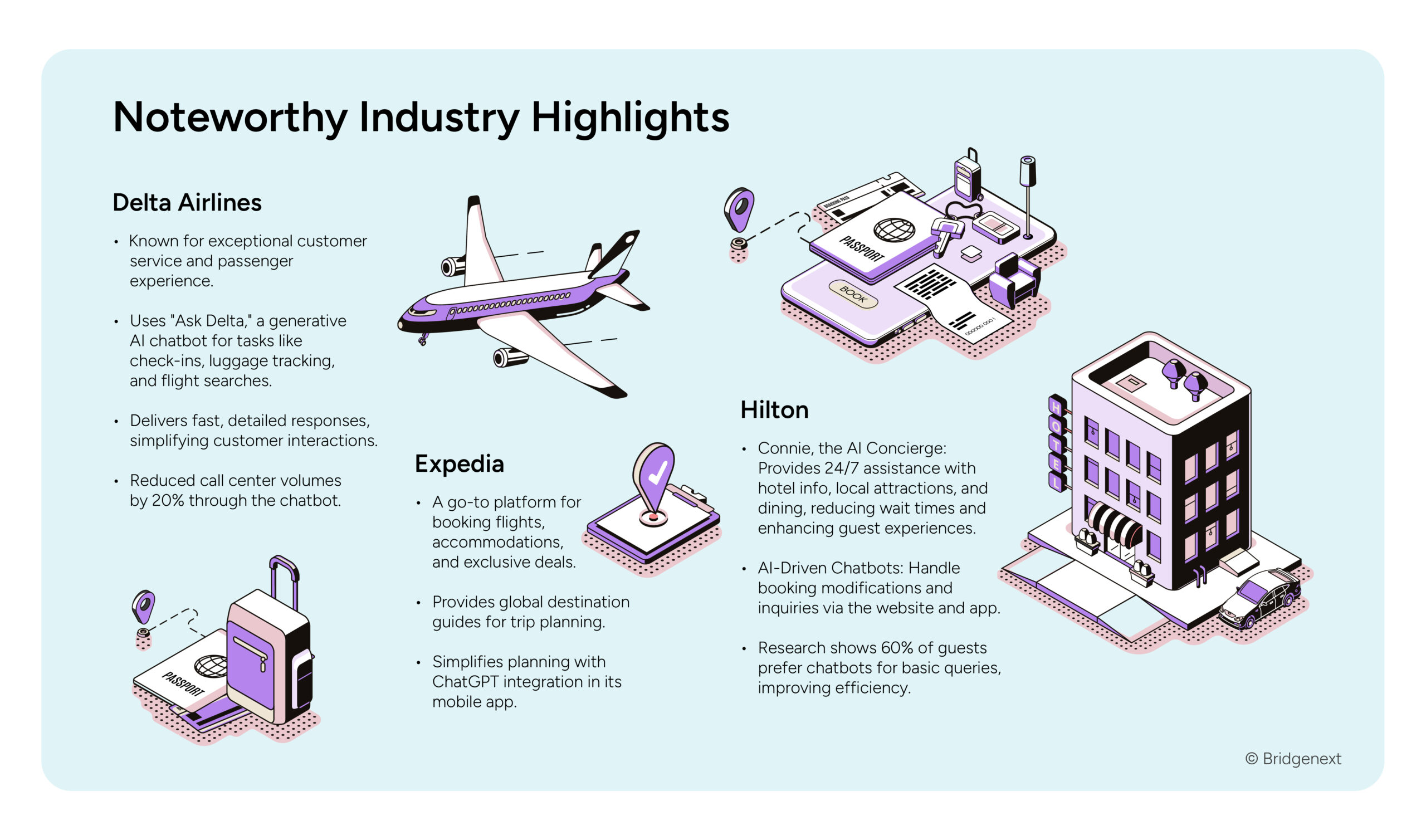10.22.24 By Bridgenext Think Tank

In the 1990s, the travel and hospitality industry relied heavily on face-to-face interactions, travel agents, and phone reservations, with limited digital engagement. Today, it’s a tech-driven world where AI chatbots, mobile apps, and real-time personalization deliver seamless support across multiple channels. The rise of GPT has transformed the way people interact with search engines, shifting their queries from short-tail keywords to more detailed, instructional sentences, mirroring the level of specificity they expect from AI-powered tools.
The focus has shifted from heavy marketing and promotions to putting the customer at the center, as they have always been the best advocates. CX now drives business success, directly influencing Customer Lifetime Value (CLV) and long-term profitability. By prioritizing CX, companies can differentiate themselves, build loyalty, attract new customers, and achieve sustainable growth.
In the travel and hospitality industry, how can technology foster deeper, more meaningful connections between businesses and customers? The answer lies in AI-powered chatbots.
Chatbots have evolved from simple automated responders into sophisticated, AI-powered tools capable of managing complex interactions. Thanks to tech like GPT, today’s chatbots are constantly learning from chatting with customers, which means they’re getting better at offering more intuitive and personal experiences. However, successful chatbot implementation requires careful planning and consideration.
While chatbots can handle many tasks, there are times when a human agent is needed. A smooth transition from chatbot to human agent is essential to maintain customer satisfaction. Key considerations include:
With advancements in artificial intelligence and machine learning, chatbots can now provide personalized, efficient, and 24/7 support to customers.
Artificial Intelligence (AI) is revolutionizing customer support in the travel and hospitality industry. From real-time issue resolution to seamless booking and personalized service, AI chatbots are transforming how businesses interact with their guests. Machine learning algorithms process vast amounts of data to uncover patterns, while natural language processing allows for smooth, human-like conversations. By adopting AI chatbots, companies can elevate the customer experience (CX), streamline operations, and position themselves as industry leaders.
Here’s why AI chatbots are game changers for travel and hospitality businesses:
You might wonder: Why focus on selling to existing customers when there’s a vast pool of new prospects to target? The answer lies in the numbers—according to Marketing Metrics, businesses have a 60-70% chance of selling to an existing customer, while the odds of converting a new prospect range from just 5-20%. By nurturing relationships through personalized, AI-driven interactions, companies can:
While early chatbot interactions were often frustrating, recent AI advancements have dramatically improved their functionality. Today’s chatbots go beyond answering basic questions—they interpret customer preferences, anticipate needs, and offer bespoke recommendations. This makes them essential tools for enhancing customer satisfaction and creating memorable experiences.
Key reasons AI chatbots are becoming indispensable in the industry.
AI chatbots are becoming irreplaceable for several key reasons:
AI-powered chatbots aren’t just improving customer experience—they’re reshaping the future of the travel and hospitality industry. The next section highlights some of the prominent examples.

Establishing a robust customer experience framework is essential for travel and hospitality businesses aiming to excel in a competitive environment. Let’s look at how chatbots can enhance each stage in the customer journey to resonate with today’s consumers.
| Customer Journey Stage | Key Experience Areas | Chatbot Functions |
|---|---|---|
| Pre-Booking | Discovery and Inspiration |
|
| Booking | Information Gathering and Selection |
|
| Post-Booking | Confirmation and Management |
|
| Trip Experience | Support and Assistance |
|
| Post-Trip | Feedback and Loyalty |
|
Incorporating AI into your customer experience strategy is no longer optional—it’s essential for sustained success. AI enables businesses to personalize services, engage with customers more meaningfully, and deliver consistent, high-quality experiences across every interaction. By proactively anticipating customer needs and embracing technological advancements, companies can build stronger relationships and secure a competitive edge in the evolving landscape.
For travel and hospitality businesses looking to take the leap, partnering with experts like Bridgenext ensures you have the right tools, strategies, and support to harness the full potential of AI and stay ahead of the curve.
The future of customer experience is here—are you ready to embrace it?
Reference
www.forbes.com/sites/patrickhull/2013/12/06/tools-for-entrepreneurs-to-retain-clients/